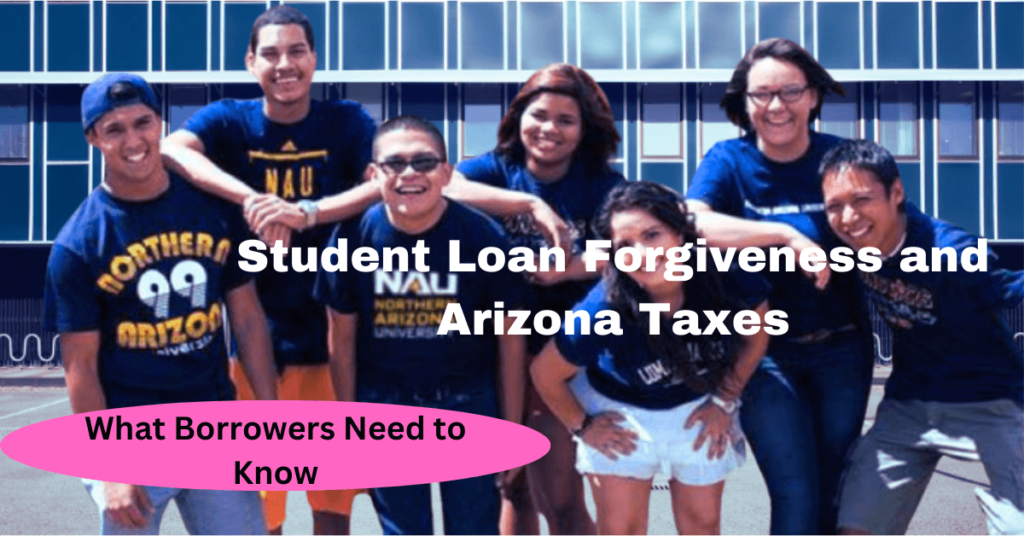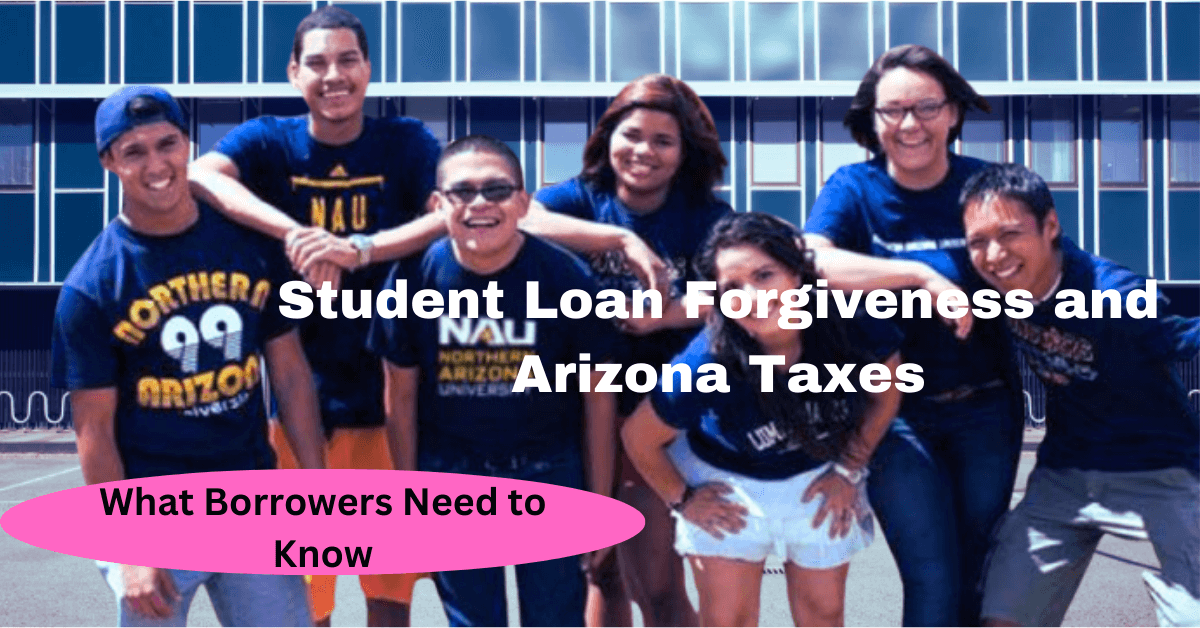Student Loan Forgiveness and Arizona Taxes: What Borrowers Need to Know Studentt loan forgiveness programs offer a lifeline to millions of borrowers across the United States. However, understanding the tax implications of these programs is crucial, especially for residents of Arizona.
If you’re asking, “How does student loan forgiveness affect Arizona taxes?” this comprehensive guide will break it down for you. From federal policies to state tax considerations, here’s everything you need to know about student loan forgiveness and Arizona taxes.deral Tax Treatment of Student Loan Forgiveness

Before discussing Arizona’s tax policies, it’s essential to understand how student loan forgiveness is treated at the federal level. Under the American Rescue Plan Act (ARPA) of 2021, most types of student loan forgiveness are not considered taxable income at the federal level through 2025. This includes forgiveness under programs such as:
- Public Service Loan Forgiveness (PSLF)
- Income-Driven Repayment (IDR) plans
- Teacher Loan Forgiveness programs
This temporary federal exemption provides significant relief to borrowers, allowing them to avoid large tax bills on forgiven debt. However, the tax treatment at the state level may differ, making it important to evaluate how Arizona taxes apply to forgiven student loans.
Are Student Loan Forgiveness Amounts Taxable in Arizona?
The big question for borrowers in the Grand Canyon State is, “Does Arizona tax student loan forgiveness?” The answer depends on the specific tax laws of the state. Currently, Arizona generally aligns with federal tax policies regarding the taxation of forgiven student loans. If your student loan forgiveness is exempt from federal taxation under ARPA, it is likely exempt from Arizona state taxes as well.
Key Programs and Their Tax Implications in Arizona
- Public Service Loan Forgiveness (PSLF): PSLF is a federal program that forgives student loans for borrowers working in qualifying public service jobs. Arizona does not impose state taxes on amounts forgiven under PSLF.
- Income-Driven Repayment Plans: Borrowers enrolled in IDR plans may have their remaining balances forgiven after 20-25 years of qualifying payments. These forgiven amounts are federally tax-exempt until 2025 under ARPA, and Arizona follows suit.
- Private Student Loan Forgiveness: Forgiveness of private student loans may be treated differently since these programs don’t always fall under federal tax exemptions. Borrowers should verify their specific situation with a tax professional.
- State-Based Forgiveness Programs: Arizona does not currently have its own student loan forgiveness program. However, state-specific initiatives could emerge in the future, potentially affecting taxation.
How Arizona Taxes Compare to Other States
When it comes to taxing forgiven student loans, Arizona’s policies are relatively favorable compared to some other states. A few states impose taxes on forgiven debt, even when it’s federally exempt. Arizona borrowers benefit from the state’s general alignment with federal tax rules, providing consistency and relief for those seeking student loan forgiveness.
Preparing for Potential Tax Liabilities
While student loan forgiveness and Arizona taxes are currently aligned with federal exemptions, it’s crucial to stay prepared for potential tax liabilities in the future. Here are a few steps borrowers can take:
1. Monitor Legislative Updates
Tax laws are subject to change, both at the federal and state levels. Arizona borrowers should keep an eye on legislative developments to ensure they are aware of any changes affecting the taxation of forgiven student loans.
2. Consult a Tax Professional
A qualified tax advisor can provide personalized guidance on how student loan forgiveness and Arizona taxes apply to your specific circumstances. They can also help you plan for any potential tax bills.
3. Budget for Possible Tax Bills
If the federal exemption on student loan forgiveness expires after 2025, forgiven amounts may become taxable again. Setting aside savings in anticipation of this possibility can help borrowers avoid financial strain.
Common Misconceptions About Student Loan Forgiveness and Arizona Taxes
It’s important to dispel some common myths surrounding student loan forgiveness taxation in Arizona:
- “All forgiven loans are tax-free.” While many forgiveness programs are federally exempt, some private loan forgiveness programs may still be taxable.
- “State laws don’t impact forgiveness.” Arizona’s tax laws align with federal exemptions for now, but state policies could change, potentially impacting taxation.
- “No action is required after forgiveness.” Borrowers should still report forgiven amounts on their tax returns and consult tax professionals for guidance.
What Arizona Borrowers Should Do Now
To make the most of student loan forgiveness while avoiding tax pitfalls, Arizona borrowers should:
- Understand Your Forgiveness Program: Whether you’re pursuing PSLF, IDR, or another program, knowing the tax implications is key.
- Keep Detailed Records: Maintain documentation of your loan forgiveness approvals and related tax filings.
- Stay Informed: Follow news updates on federal and state tax policies regarding student loan forgiveness.
- Seek Expert Advice: Tax professionals can provide valuable insights tailored to your unique financial situation.
Federal Tax Treatment of Student Loan Forgiveness
Before discussing Arizona’s tax policies, it’s essential to understand how student loan forgiveness is treated at the federal level. Under the American Rescue Plan Act (ARPA) of 2021, most types of student loan forgiveness are not considered taxable income at the federal level through 2025. This includes forgiveness under programs such as:
- Public Service Loan Forgiveness (PSLF)
- Income-Driven Repayment (IDR) plans
- Teacher Loan Forgiveness programs
This temporary federal exemption provides significant relief to borrowers, allowing them to avoid large tax bills on forgiven debt. However, the tax treatment at the state level may differ, making it important to evaluate how Arizona taxes apply to forgiven student loans.
Are Student Loan Forgiveness Amounts Taxable in Arizona?
The big question for borrowers in the Grand Canyon State is, “Does Arizona tax student loan forgiveness?” The answer depends on the specific tax laws of the state. Currently, Arizona generally aligns with federal tax policies regarding the taxation of forgiven student loans. If your student loan forgiveness is exempt from federal taxation under ARPA, it is likely exempt from Arizona state taxes as well.
Key Programs and Their Tax Implications in Arizona
- Public Service Loan Forgiveness (PSLF): PSLF is a federal program that forgives student loans for borrowers working in qualifying public service jobs. Arizona does not impose state taxes on amounts forgiven under PSLF.
- Income-Driven Repayment Plans: Borrowers enrolled in IDR plans may have their remaining balances forgiven after 20-25 years of qualifying payments. These forgiven amounts are federally tax-exempt until 2025 under ARPA, and Arizona follows suit.
- Private Student Loan Forgiveness: Forgiveness of private student loans may be treated differently since these programs don’t always fall under federal tax exemptions. Borrowers should verify their specific situation with a tax professional.
- State-Based Forgiveness Programs: Arizona does not currently have its own student loan forgiveness program. However, state-specific initiatives could emerge in the future, potentially affecting taxation.
How Arizona Taxes Compare to Other States
When it comes to taxing forgiven student loans, Arizona’s policies are relatively favorable compared to some other states. A few states impose taxes on forgiven debt, even when it’s federally exempt. Arizona borrowers benefit from the state’s general alignment with federal tax rules, providing consistency and relief for those seeking student loan forgiveness.
Preparing for Potential Tax Liabilities
While student loan forgiveness and Arizona taxes are currently aligned with federal exemptions, it’s crucial to stay prepared for potential tax liabilities in the future. Here are a few steps borrowers can take:
1. Monitor Legislative Updates
Tax laws are subject to change, both at the federal and state levels. Arizona borrowers should keep an eye on legislative developments to ensure they are aware of any changes affecting the taxation of forgiven student loans.
2. Consult a Tax Professional
A qualified tax advisor can provide personalized guidance on how student loan forgiveness and Arizona taxes apply to your specific circumstances. They can also help you plan for any potential tax bills.
3. Budget for Possible Tax Bills
If the federal exemption on student loan forgiveness expires after 2025, forgiven amounts may become taxable again. Setting aside savings in anticipation of this possibility can help borrowers avoid financial strain.
Common Misconceptions About Student Loan Forgiveness and Arizona Taxes
It’s important to dispel some common myths surrounding student loan forgiveness taxation in Arizona:
- “All forgiven loans are tax-free.” While many forgiveness programs are federally exempt, some private loan forgiveness programs may still be taxable.
- “State laws don’t impact forgiveness.” Arizona’s tax laws align with federal exemptions for now, but state policies could change, potentially impacting taxation.
- “No action is required after forgiveness.” Borrowers should still report forgiven amounts on their tax returns and consult tax professionals for guidance.
What Arizona Borrowers Should Do Now
To make the most of student loan forgiveness while avoiding tax pitfalls, Arizona borrowers should:
- Understand Your Forgiveness Program: Whether you’re pursuing PSLF, IDR, or another program, knowing the tax implications is key.
- Keep Detailed Records: Maintain documentation of your loan forgiveness approvals and related tax filings.
- Stay Informed: Follow news updates on federal and state tax policies regarding student loan forgiveness.
- Seek Expert Advice: Tax professionals can provide valuable insights tailored to your unique financial situation.
Conclusion: Understanding Student Loan Forgiveness and Arizona Taxes
For most borrowers, student loan forgiveness in Arizona is not taxable, provided it falls under federal exemptions such as those established by ARPA. However, understanding the nuances of both federal and state tax laws is critical to avoiding unexpected financial burdens. Arizona’s alignment with federal tax policies offers significant relief, but borrowers must remain vigilant and proactive to navigate potential changes in the future.
Whether you’re pursuing forgiveness through PSLF, IDR, or another program, staying informed about student loan forgiveness and Arizona taxes can help you make confident, financially sound decisions for the road ahead.

